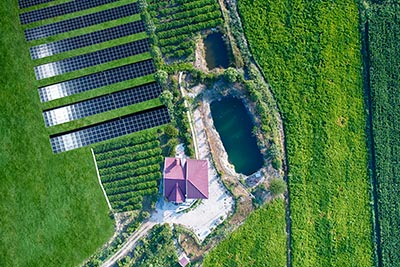
We Aussies love our swimming pools. In fact, not only do we have more pools per head than any other country, but the percentage of homes with pools is increasing each year.
In 2018 13% of Australian homes had a swimming pool, up a full percentage point from only a few years before. That’s almost 3 million Australians living in a house with a pool!
Unfortunately, as great as swimming pools are, they cost a fortune to run, which is why so many pool owners are looking towards solar to cut costs.
Typical costs of heating a swimming pool
An average in-ground pool will account for around 17% of a home’s energy usage. And if you think that’s a lot, wait for it… that’s only for the pump!
To heat a pool sends that figure through the roof.
Depending on usage, heating a swimming pool can cost up to an additional $2000 per year.
On top of that, you have maintenance costs.
Australians spend about $1000 to $1400 or more on pool maintenance per year, including things like chemicals, cleaning, and replacement parts.
So, in total, if you use your pool a lot, you could be looking at an extra $3K – $4K per year just to run it.
The easiest way to cut costs is to use the sun’s free energy to heat it, and there are two ways to do that.
You can either install a PV system specifically for your pool or hook your pool up to your home’s solar panels.

Solar power specifically for a pool
The pool’s pump is where all the electricity goes, costing hundreds of dollars per year to run, even for a small pool.
A solar PV system solely dedicated to your swimming pool essentially takes it “off-grid”, using the sun’s energy to fuel the pump.
While this won’t heat your pool, it will dramatically cut electricity costs.
A stand-alone solar pump for your pool doesn’t have any running costs once installed, and also won’t produce any carbon emissions, allowing you to run your pool in an environmentally friendly way.
Heating a pool with your existing PV system
If you already have a solar PV system in your home, then it’s easy to connect your swimming pool and use the energy you create to power your pump.
Depending on the size of your home PV system, this could cover all costs associated with your pool. And unlike a stand-alone solar pool pump, any excess energy isn’t wasted, it simply goes back into your home or into the grid for a feed-in tariff.
Having a pool connected to your home’s solar panels means that if there’s not enough electricity to run it, then you can still use the grid if you need to.
Which should I choose?
There are pros and cons to both solar pumps and home PV systems.
Solar pumps are cheaper to buy and install, but don’t give you as much bang for your buck.
If you’ve already got home solar panels, then it’s the smart thing to do to simply hook your swimming pool up to them along with the rest of the house.
If you have neither and you’re wondering which to get, then we suggest investing in a home solar system.
Either one you choose is better than paying the energy company for something you can make for yourself!
We can help with all your solar power questions
If you’re thinking of installing a swimming pool or already have one and want to cut costs, then installing solar panels will help dramatically.
Whether it’s a dedicated solar pump or a full PV system for your home, either option will save you money in the long term.
But we understand that solar panels and energy costs are all very complicated, so if you have any questions, please feel free to contact us for a chat.
It’s always wise to get professional advice, especially with something as important as this.
Our highly skilled engineers are fully accredited and licensed by the Clean Energy Council (CEC), so you can depend on us to know what we’re talking about and give you the best advice.
Contact us today for any questions regarding solar power, solar PV systems, or solar and swimming pools.

Bright Earth Solar offers a range of exceptional solar products, helping you save money while doing your bit to save the planet. We keep you up to date with new technology, innovation and trends in renewable energy.


